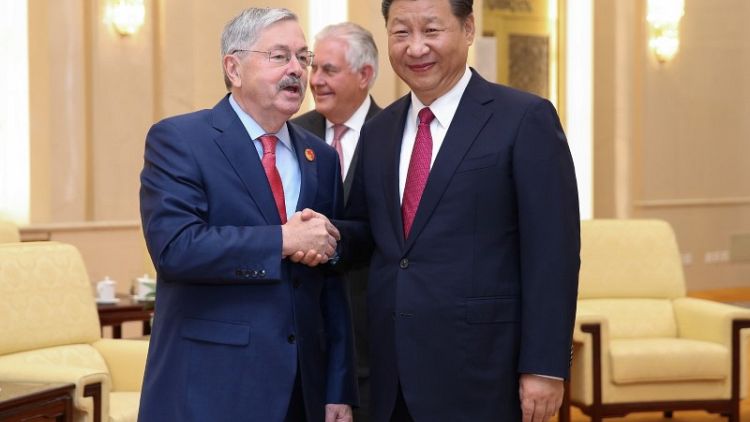By David Brunnstrom
WASHINGTON (Reuters) - A "frank" exchange of views can be expected in top-level diplomatic and security talks between the United States and China on Friday, including on issues such as human rights and the South China Sea, the U.S. ambassador to China said.
Terry Branstad told reporters at the State Department on Thursday that the United States would seek progress on priority issues, including North Korea, and that there would also be discussions on strategic security and how "to avoid mistakes or accidents that can happen in the military arena."
U.S. Secretary of State Mike Pompeo and Defense Secretary Jim Mattis will take part in the talks in Washington, with Chinese politburo member Yang Jiechi and Defense Minister Wei Fenghe. They were supposed to have been held in Beijing in October but were delayed amid rising tension over trade, Taiwan and the South China Sea.
While the focus will be on diplomacy and security, moves to try to resolve a damaging trade war between the two countries are expected to be touched upon ahead of a planned meeting between U.S. President Donald Trump and Chinese President Xi Jinping at the G20 in Argentina at the end of November.
"We want this to be a constructive, results-oriented relationship with China," Branstad said. "The U.S. is not trying to contain China but we want fairness and reciprocity."
China and the United States have put tariffs on hundreds of billions of dollars of each other's goods and Trump has threatened to set tariffs on the remainder of China's $500 billion-plus exports to the United States if the dispute cannot be resolved.
A resumption of high-level dialogue, marked by a phone call last week between the presidents, has raised some hopes, but the Trump administration has also accused China of interfering in U.S. politics, charges China strongly denies. The two have also sparred over the disputed South China Sea and self-ruled Taiwan, which China claims.
Washington has also been increasingly critical of Chinese treatment of religious minorities, including Uighur Muslims in the western Chinese region of Xinjiang.
"The diplomatic and security dialogue is a forum for a frank, open exchange of views on a full range of issues from the South China Sea, to human rights," Branstad.
He noted Beijing's cooperation on a range of international issues, calling it a "very key player" in getting North Korea back to negotiations.
Discussion is also expected on Friday of U.S. plans to quit the 1987 Intermediate-Range Nuclear Forces Treaty with Russia, which has sparked Chinese worries that it could lead to the stationing of U.S. land-based missiles in Asia.
Xi Jinping said on Thursday that China wants to resolve problems through talks, but Washington must respect Beijing's choice of development path and interests.
China's Foreign Ministry said Yang Jiechi met U.S. national security adviser John Bolton on Wednesday and said the two sides should "properly manage differences and carefully prepare to ensure positive results in the Argentina meeting."
"China is committed to working with the U.S. to achieve a no-confrontational, conflict-free, mutually respectful co-operation in which both sides win," it quoted Yang as saying.
(Reporting by David Brunnstrom and Lesley Wroughton, Editing by Rosalba O'Brien)
